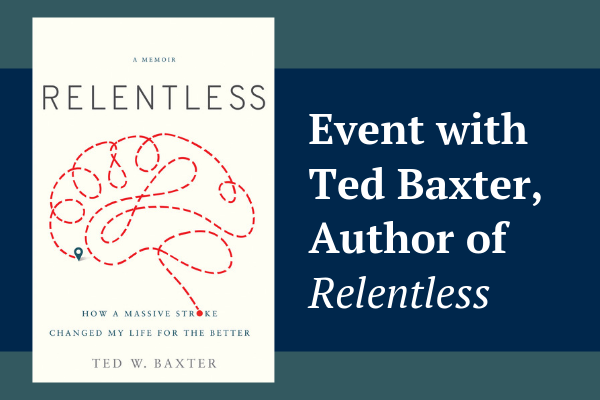The University of Michigan Aphasia Program (UMAP) is sponsoring a special event in honor of Aphasia Awareness Month, June. We are excited to invite you to a book reading and signing with author, stroke survivor, and former UMAP client, Ted Baxter! In addition to reading from his recovery memoir, Relentless, Ted will give a short talk and answer questions about what he’s learned on his journey. Ann Arbor independent bookstore Nicola’s Books is graciously hosting.
In 2005, Ted was at the top of his game, with a successful career in finance and a commitment to a healthy lifestyle, when an ischemic stroke brought his life to a halt. His doctors didn’t know if he would survive, let alone be able to speak or walk again. Relentless is the story of his recovery — the comeback from stroke to the fight against aphasia. Relentless is a wonderful resource for stroke survivors, their caregivers, and loved ones, but is also a motivating read for anyone facing a personal challenge.
Ted attended UMAP as part of his recovery, an experience he writes about in Relentless. Now he volunteers his time at hospitals and other health institutions, providing his expertise and experience as a stroke survivor in a communication recovery program.
The event is set for 7 p.m. on Wednesday, June 5, 2019 at Nicola’s Books in Ann Arbor, MI. All are invited and welcome to attend. Copies of Relentless will be available for purchase and Ted will be available for questions after the reading and book signing. We hope to see you there!
Details
- What: Ted Baxter Book Reading, Signing, and Q&A
- When: 7 p.m. on Wednesday, June 5, 2019
- Where: Nicola’s Books, 2513 Jackson Ave., Ann Arbor, MI
What is Aphasia?
June is Aphasia Awareness Month. More than 2 million people in the U.S. are estimated to have aphasia, an acquired communication disorder. Aphasia commonly occurs following a stroke, head injury, or illness. It can rob a person of their ability to communicate, but does not affect intellect. It can be incredibly challenging and isolating. Aphasia awareness is meant to bring about understanding and compassion for people with aphasia, while also increasing access to care, support, and research related to aphasia.

